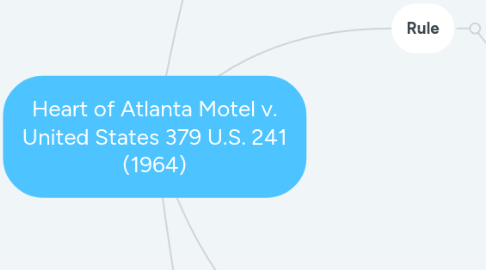
1. Issue
1.1. Facts of the case
1.1.1. Heart of Atlanta engages in interstate commerce
1.1.1.1. National advertising and solicits business from outside the state
1.1.1.2. 75% of registered guests are from out of state
1.1.1.3. Heart of Atlanta Motel located near interstate highway
1.1.2. Hotel had policy of refusing to rent rooms to Negros. Continued to follow policy after passage of Civil Rights Act of 1964 which is why if filed this lawsuit
1.1.3. Appellant contends that Congress exceeded it's authority under Article 1 of constitution commerce clause because it violates 5th Amendment (taking property without due process) and 13th Amendment (requiring involuntary servitude)
1.1.4. Appellees counter that refusing Negros accommodations interferes with interstate travel, and Congress was within authority to regulate under commerce clause. Also, 5th amendment is not violated because no property was taken
1.2. Issue facing the court
1.2.1. Whether this business was affecting the commerce of more than one state when it denied renting rooms to Negros
2. Rule
2.1. Article 1, section 8, clause 3 otherwise known as the "Commerce Clause"
2.1.1. Commerce Clause states that the federal government shall have power "To regulate Commerce with foreign Nations, and among the several States, and with the Indian Tribes."
3. Application
3.1. US Supreme Court upheld Civil Rights Act of 1964 in application to the private sector on grounds that Congress has ability to regulate commerce between states
3.1.1. Exceptions to application of Civil Rights Act of 1964 to private sector if business does not engage in interstate commerce
3.1.1.1. While application of the commerce clause may seem clear, even private parties indirectly engaging in interstate commerce may fall under regulation of commerce clause, see Wickard v. Filburn, 317 U.S. 111 (1942). In Wickard v. Filburn a private farmer growing crops for his own consumption was found to be participating in interstate commerce.
3.1.1.2. Due to Wickard v. Filburn precedent, US Federal Government can essentially regulate any business activity
